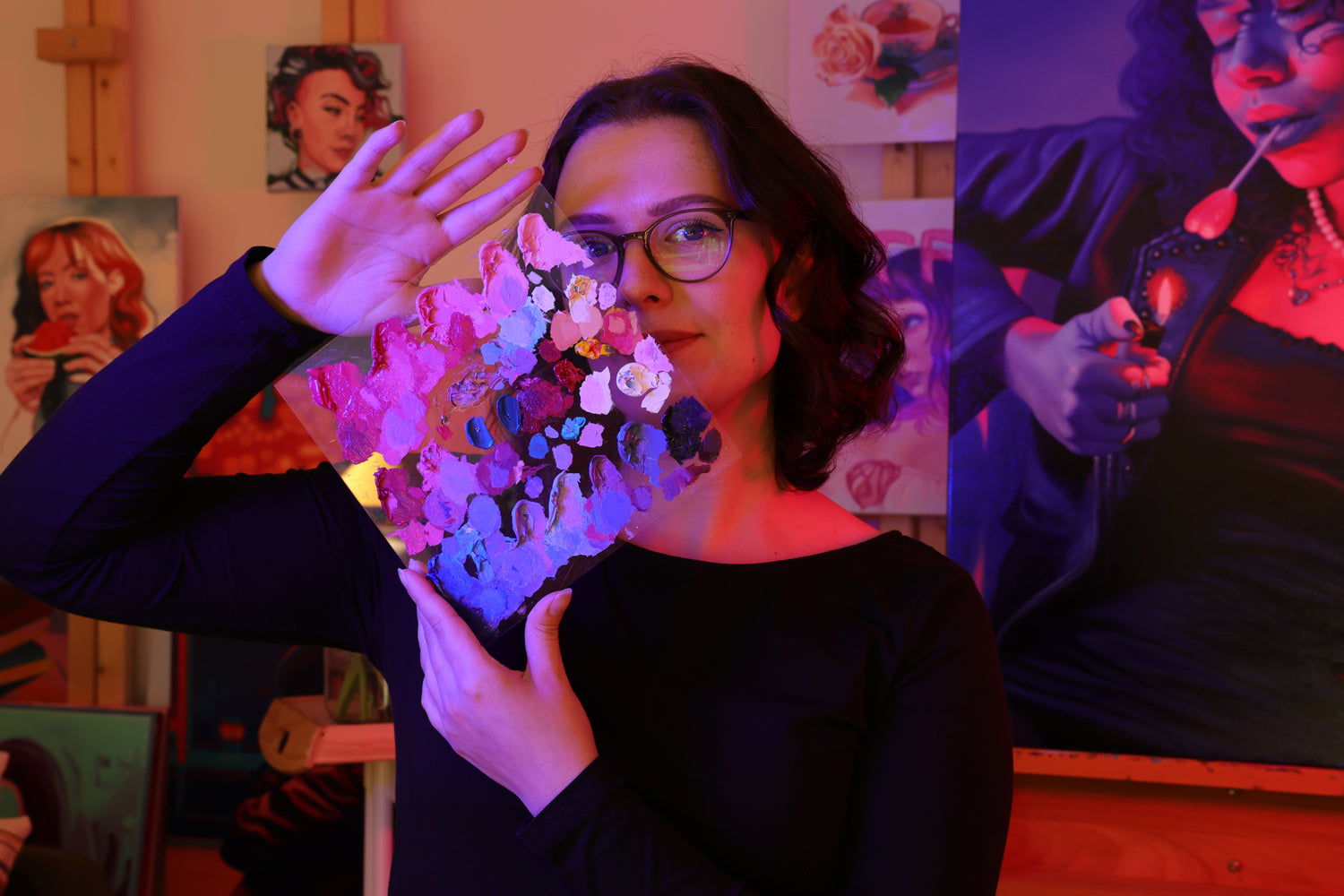Hi, I'm Izabela
I’m Izabela Krajnik, born in 1999 in Poland and now based in Frankfurt am Main, where I’m building my artistic path. At 14, I moved to Germany without speaking German. Looking back, that was the moment I learned how much can be said without words at all. Maybe that’s what led me to art in the first place.
Through painting, I try to express what’s hard to put into language: emotions, insecurities, hope, inner chaos – all the things we quietly carry with us. I work with oil because it allows me to slow down, to linger in details and moods. My motifs often come from my own photos, but they’re staged, not literal. They look realistic in style, but the scenes themselves don’t exist in reality – they live somewhere in between.
The themes in my work found me rather than the other way around. They revolve around inner states, about what moves us, hurts us, connects us. I draw inspiration from encounters, conversations, music, or a film that lingers – and of course from other artists, like Jenny Saville, Alyssa Monks, Nicolai Ganichev, or Zdzisław Beksiński. Each of them emotional and intense in their own way.
When I started posting on social media in 2021, it wasn’t meant as a stage – more like a diary, a way to stay consistent. The fact that people connected with it, that it even led to sales, honestly surprised me. But at some point, the pressure became too much. In 2024, I pulled the plug and reminded myself: this is not a sprint, it’s a lifelong project. It can grow, shift, and also take pauses.
Certain motifs keep returning in my paintings – especially hands, eyes, and hearts. For me, they are strong symbols of what lies beneath the surface: vulnerability, connection, humanity. I deeply believe that art should trigger a feeling – not “understanding,” but rather “re-feeling.” And if someone experiences that when looking at my work, it’s the greatest compliment I can receive.

Art is to console those who are broken by life
Vincent van Gogh
FAQ
What is your art about?
I paint emotions—raw, messy, and unfiltered. My work is about making sense of the chaos, turning feelings into something you can actually see.
Also, I try to process everything that’s messy in this world. Sometimes, I feel like I was made of the thinnest skin possible—I can literally feel everyone’s pain. I try not to let it consume me, because if I did, I’d break. But for art, this actually helps. It gives me a way to express those feelings and make sense of them.
Do you work with reference photos, or is everything from your imagination?
I use both. I always start with a reference—right now, I take my own photos—but I never stick to them 100%. I tweak colors, add abstract elements, and let things shift as I go. Faces change, emotions take over. I try to let the painting guide me, but I also spend time shaping the vision before I even start. It’s a mix of intuition and planning, all with the goal of making the best possible piece with all the tools I have while staying true to myself.
What inspires you?
I love cinema—whether it’s live-action or animation, I’m always fascinated by how everything is built from scratch. That same magic exists in real life too, in those unexpected moments when light hits just right—the blue hour, a single ray of sun breaking through a cloudy sky, a rainbow.
I’m drawn to contrasts. Living in a big city (which people call Crackfurt for a reason), I see a lot of the ugly sides of life. But even in that ugliness, there are moments of humanity, empathy, and hope that shine through. Sometimes it’s the light, sometimes it’s the people—sometimes it’s both.
If you were starting your journey again, what would you do differently?
With the experience I have now—and still not being in a place where I can live off my art alone—I’d say the biggest lesson is that artists are always evolving. There’s never a ‘right’ time to start, pause, or put yourself out there. It’s all about experimenting and understanding that failure is actually one of the most important parts of the process.
Oh, and there’s no universal marketing strategy that works for everyone. The only thing that really matters is staying authentic, pushing past your comfort zone, and making space to heal and recharge. Creative work can be draining, and if you don’t protect your energy, you burn out fast. I wish I had truly understood that earlier.
What’s your process when you hit a creative block?
When I hit a creative block, I don’t force it. I step away and clear my head. I ask myself, 'What’s actually stopping me?' Then, I write down all the steps or thoughts that are holding me back from creating. Sometimes the problem isn’t easy to pinpoint, so I stop actively trying to create and focus on recharging. If I can, I take a day off, meet people, or spend time outside—it really helps. Creativity can’t be rushed, and stepping back is often the best way to move forward.